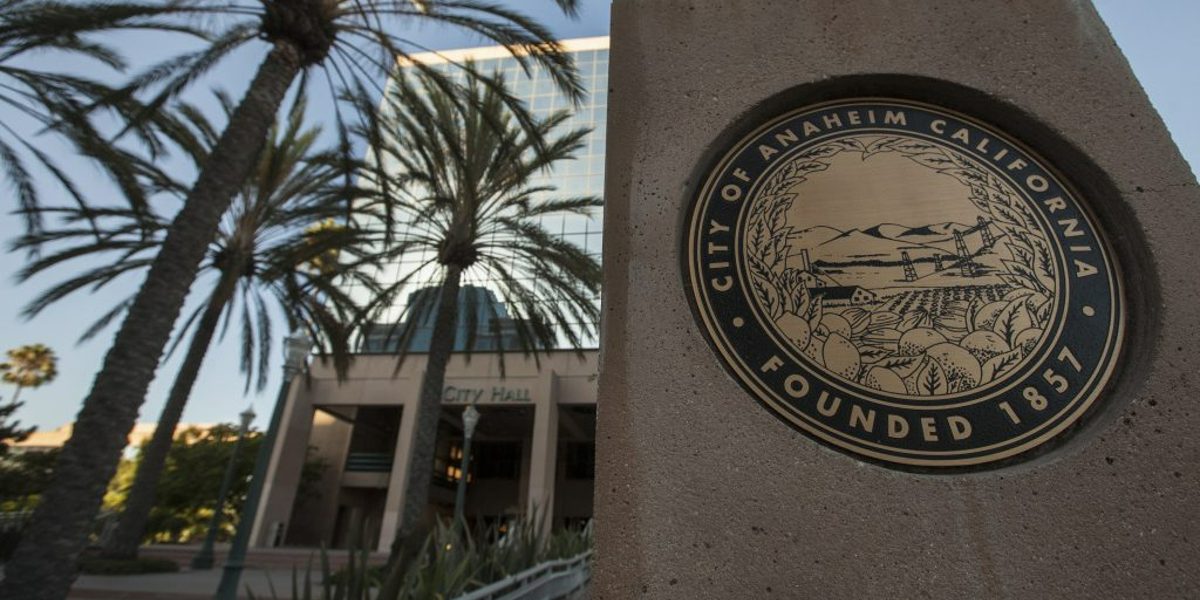An LA-style ballot measure imposing huge wage increases and Byzantine work rules on all Anaheim hotels and event centers would deliver a nearly $9 million annual hit to the city’s budget, according to an expert analysis commissioned by the city. The ballot measure is sponsored by UNITE-HERE Local 11, the militant hotel workers union that represents employees at five Anaheim hotels.
An even wider range of small businesses would be caught in the ballot measures’ complicated web of rules and wage hikes due to its expansive definition of “event center,” according to the report. These would include Camelot miniature golf, the Anaheim Packing House, the Anaheim Hills Golf Course Clubhouse and the iconic Linbrook Bowl.
The ballot measure would impose a $ 25-an-hour minimum wage on all Anaheim hotels and event centers, which would increase annually by 3% or the Consumer Price Index – whichever is higher – starting in 2026. Affected businesses would have to raise their minimum wage to $25 within 10 days of the measure being certified.
Many of these businesses struggled to survive the COVID pandemic closures. If the Local 11 measure passes, they would be hit with crippling wage increases and litigation exposure within days.
Baker-Tilly, the form which conducted the study, had only 30 days to complete it due to time restrictions imposed under state law, and for that reason focused primarily on the impact the Anaheim Convention Center (ACC), the city-owned facility that is a fundamental component of the city’s economic engine.
“We estimate a negative impact on ACC operations ranging from $7.3 million to $8.6 million per year,” according to the study. “The ACC and other event centers may struggle to raise process and increase revenues to cover these cost increases, especially in the near and medium term, because convention contracts are typically signed years in advance of an event and are based on the overall market for convention hosting services, which is highly price competitive.”
Convention bookings are locked in several years in advance – so the ACC can’t unilaterally jack up the price of those contracts to compensate for increased labor costs in the millions of dollars. “Anaheim not currently considered a particularly affordable convention location,” states the report, and will become even less competitive should the initiative pass.
Passage of the initiative would make it more difficult to retain marquis conventions like NAMM and Natural Products Expo West – which generate millions in tax revenue for the city – or to attract new shows.
City-owned Angel Stadium, Honda Center and City National Grove of Anaheim are estimated to see a 19 increase in operating costs should the initiative be approved, according to the report.
The study also predicted an the ACC’s operating costs would spike by $6.1 million in the first year alone, negatively impact funding for libraries, YMCAs, schools and religious groups, cause job losses at private entertainment facilities such as Camelot Golfland, House of Blues, Packing House, Sky Zone Trampoline Park and dozens more.
“What business or city can afford a 40 percent cost increase right now?” asked Greg Eisenman, General Manager of the family-owned Tropicana Inn and the Camelot Inn. “No one can. Why can one special interest dictate how one vital Anaheim economic sector works? The consequences of this proposal will be immediate and not good for all of Anaheim.”
“It makes no sense for Anaheim to do this,” said Kim Painter, General Manager of the Anaheim Majestic Garden Hotel. “The city can’t afford to lose the revenue generated by the Convention Center when it’s already facing a substantial budget deficit. Our Council Members must realize the slippery economic slope this proposal puts taxpayers on.”
Critics point out the built-in wage escalator will fuel wage inflation, and consequently the costs of hotel rooms and services. If the initiative had been in effect in 2019, the minimum wage at Anaheim hotels and event centers would have already increased to $30.51, according to the report.
Union Initiative Much Broader Than Its Sponsor Admits
While UNITE-HERE Local 11 casts the initiative as improving working conditions for hotel housekeepers, it’s provisions encompass a much broader universe of businesses and workers.
For example, the way the measure defines event centers, the minimum wage and work rules provisions will apply to contractors hired by the city or private venues, because “employees of these vendors can also be classified as event center workers,” according to the report.
As the Baker-Tilly report notes, due the language used by UNITE-HERE in its initiative, a whole raft of private venues that wouldn’t normally be viewed as event centers come under the measure’s onerous provisions. These include the American Sport Center; the Anaheim Hills Golf Course Clubhouse; Camelot, the Center Street Promenade; the Downtown Community Center; GardenWalk cinemas; Glover Stadium; Hobby City; the House of Blues; K2 Racing; Linbrook Bowl; M3 Live; the Packing House; Pearson Park Amphitheater; the River Arena; Sky Zone Trampoline Park; The Ranch Saloon.
That is a partial list.
Linbrook Bowl barely survived the COVID restrictions. UNITE-HERE’s initiative would boost its labor costs by 60% virtually overnight. That kind of financial shock could be enough to permanently darken its iconic neon bowling pin sign.
Currently, a game of miniature golf at Camelot costs a family of four $52. How much will that will skyrocket if Camelot’s labor costs jump 60% in 10 days?
The Uncertainty Tax
One of the arguments made in favor of a scheduling Local 11’s measure for a special election is the need to minimize economic uncertainty.
UNITE-HERE wants it on the November 2024 ballot because the union assumes the electorate in a higher-turnout presidential election will be more labor-friendly.
However, the economic impacts of the initiative are so dramatic, that postponing resolution of the matter for 18 months will discourage any investment in the effected sectors. Who is going to buy a hotel, plan for renovations or increased hiring when they have no idea whether the minimum wage will be $15.50 or $25? Whether housekeppers can clean 11-12 rooms in an eight-hour shift, or only 5-6 rooms? How do you price in the litigation exposure when any employee can sue you for any compliance issue stemming from the measure’s byzantine rules? Try getting financing for an expansion or purchase amidst that kind of uncertainty – especially in this period of rising interest rates.
The reality delaying a vote on the initiative until November 2024 will put investment on ice and throw Anaheom hotels and event centers into financial limbo. That is millions of dollars in opportunity costs incurred in the service of UNITE-HERE Local 11’s campaign strategy.
The Baker-Tilly report focused on ballot measure’s impact to the Anaheim Convention Center – which will cost Anaheim taxpayers nearly $9 million a year. That does not include the hit to the general fund from lost TOT tax revenues, lost convention business, lost jobs, lost businesses.
In February of this year, Mayor Ashleigh Aitken was justifiably reluctant to increase the JL Group’s investigating budget by $750,000.
“That’s three firefighters for us we could put on the streets and serve the community,” Aitken said.
By that calculus, the $8.6 million hit to the Anaheim Convention Center alone would pay for 34 firefighters.
Still to be released is the Beacon Economics report, which will focus on how the UNITE-HERE measure will increase operating costs for Anaheim hotels and evnet centers, and “potential” loss of Transient Occupancy Tax (TOT) revenues that fund city services. If the Baker-Tiller report is an indicators, the revenue losses for the city will be big.
Last month, Mayor Aitken and Councilman Carlos Leon wanted the city take a leap into the fiscal and economic dark when they voted to adopt the initiative as an ordinance without any idea how it would affect the city’s ability to fund public services and foster economic vitality. What was a heedless and ill-advised vote at the time is only more so now.


